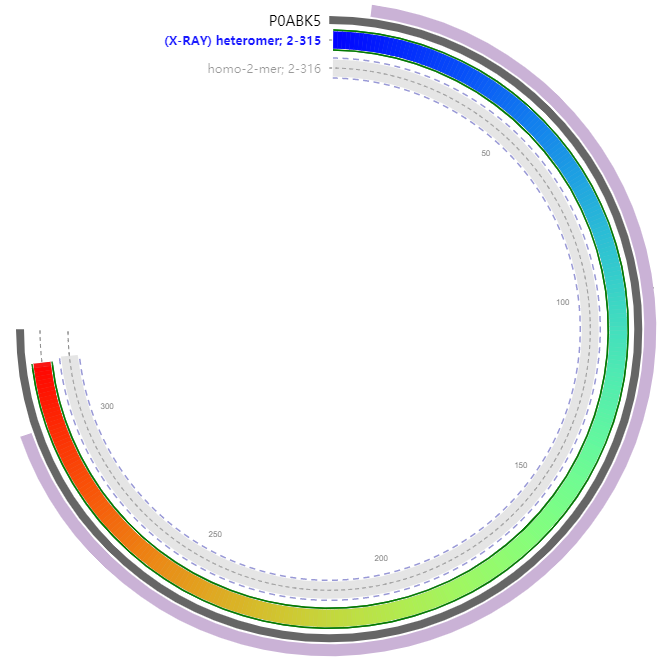Catalyzes the conversion of O-acetylserine to cysteine. hydrogen sulfide + O-acetyl-L-serine = acetate + L-cysteine.
MSKIFEDNSLTIGHTPLVRLNRIGNGRILAKVESRNPSFSVKCRIGANMIWDAEKRGVLK
PGVELVEPTSGNTGIALAYVAAARGYKLTLTMPETMSIERRKLLKALGANLVLTEGAKGM
KGAIQKAEEIVASNPEKYLLLQQFSNPANPEIHEKTTGPEIWEDTDGQVDVFIAGVGTGG
TLTGVSRYIKGTKGKTDLISVAVEPTDSPVIAQALAGEEIKPGPHKIQGIGAGFIPANLD
LKLVDKVIGITNEEAISTARRLMEEEGILAGISSGAAVAAALKLQEDESFTNKNIVVILP
SSGERYLSTALFADLFTEKELQQ
329

| PMID | Title & Author | Abstract | Year | |
| 0 | 3062311 | Phylogeny of metabolic pathways: O-acetylserine sulphydrylase A is homologous to the tryptophan synthase beta subunit.Levy S, Danchin A | The cysK gene of Escherichia coli K-12 encoding O-acetylserine sulphydrylase A, was cloned and its nucleotide sequence, together with that of the flanking regions, was determined. The deduced amino acid sequence of the carboxy-terminal moiety of O-acetylserine sulphydrylase A shows significant similarity to the amino acid sequence of tryptophan synthase beta chain from several organisms. This sequence similarity is likely to reflect the structural homologies of substrates shared by both enzymes. This may indicate that these proteins, although catalysing different reactions in different metabolic pathways, have evolved from a common ancestral gene. | 1988 |
| 1 | 10613873 | Cysteine biosynthesis pathway in the archaeon Methanosarcina barkeri encoded by acquired bacterial genes? Kitabatake M, So MW, Tumbula DL, Soll D | The pathway of cysteine biosynthesis in archaea is still unexplored. Complementation of a cysteine auxotrophic Escherichia coli strain NK3 led to the isolation of the Methanosarcina barkeri cysK gene [encoding O-acetylserine (thiol)-lyase-A], which displays great similarity to bacterial cysK genes. Adjacent to cysK is an open reading frame orthologous to bacterial cysE (serine transacetylase) genes. These two genes could account for cysteine biosynthesis in this archaeon. Analysis of recent genome data revealed the presence of bacteria-like cysM genes [encoding O-acetylserine (thiol)-lyase-B] in Pyrococcus spp., Sulfolobus solfataricus, and Thermoplasma acidophilum. However, no orthologs for these genes can be found in Methanococcus jannaschii, Methanobacterium thermoautotrophicum, and Archaeoglobus fulgidus, implying the existence of unrecognizable genes for the same function or a different cysteine biosynthesis pathway. | 2000 |
| 2 | 30311712 | Cysteine synthase A overexpression in Corynebacterium glutamicum enhances l-isoleucine production.Wenjian Ma , Jianli Wang , Ye Li , Xiaoyuan Wang | Cysteine synthase A (CysK) catalyzes the last reaction of l-cysteine synthesis in bacteria, but its moonlighting functions have been revealed recently. In this study, CysK was overexpressed in Corynebacterium glutamicum IWJ001, an l-isoleucine producer. Compared with the control IWJ001/pDXW-8, IWJ001/pDXW-8-cysK cells grew fast during log phase, and produced 26.5% more l-isoleucine in flask fermentation and 23.5% more l-isoleucine in fed-batch fermentation. The key genes aspC, lysC, hom, thrB, ilvA, and ilvBN involved in l-isoleucine biosynthesis were all upregulated in IWJ001/pDXW-8-cysK, compared with IWJ001/pDXW-8. In addition, IWJ001/pDXW-8-cysK cells were longer and thicker than IWJ001/pDXW-8 cells. Compared with IWJ001/pDXW-8, the membrane permeability increased 15.8% and biofilm formation ability decreased 71.3% for IWJ001/pDXW-8-cysK cells. The results demonstrate that CysK overexpression in C. glutamicum is a good approach to enhance l-isoleucine production. | 2019 |
Tanous C , Soutourina O , Raynal B , et al. The CymR Regulator in Complex with the Enzyme CysK Controls Cysteine Metabolism in Bacillus subtilis[J]. Journal of Biological Chemistry, 2008, 283(51):35551-35560.